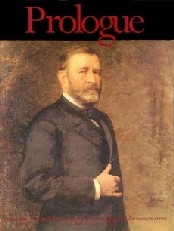(January 1, 2018) The many hagiographies of Ulysses Grant released in recent years—including three in 2017—commonly portray him as personally innocent of the corruption during his presidency. Instead he is painted as a naive victim of associates who betrayed him. But his pattern of accepting gifts from influence peddlers and his connections to others who admitted to, were hounded by, or resigned under, accusations of impropriety give ample reason to question Grant’s honesty. His role in the Whiskey Ring tax evasion scandal merits particular scrutiny.
The episode enabled distillers to evade about two-third’s of the taxes they owned in exchange for bribes that were used to line the pockets of recipients and to fund the campaigns of Grant’s political allies. The evasion ended only because Grant was basically compelled to appoint reform-minded Benjamin Bristow as Treasury Secretary two years into the President’s second term because Bristow’s predecessor had resigned in disgrace for unrelated tax collection improprieties. Ultimately Bristow’s investigation led to the threshold of the presidency when Grant’s personal secretary, Orville Babcock, was indicted as a leading Ring participant that involved hundreds of lower status members. According to General of the Army, William T. Sherman, “…those who go to see the President see Babcock first. He is a kind of intermediator between the people and the President.”
In the fall of the year 2000, Timothy Rives authored a good summary of the episode in Volume 32, Issue Number 3 of Prologue Magazine, which is published by the National Archives in an article titled, “Grant, Babcock and the Whiskey Ring.”

Grant responded to the accusations against Babcock as follows:
- Since Babcock was an army officer as well as a personal secretary, Grant tried to get the investigation shifted to the Army. The President even went so far as to name the Babcock-friendly judge advocate (military prosecutor) as well as the equally Grant-pliable officers for the tribunal. The Justice Department prosecutor in St. Louis blocked the move by correctly replying that he could not send his evidence to the distant military tribunal because it was illegal to remove evidence from the court of jurisdiction.
- Next, Grant hired a spy—at taxpayer expense—to infiltrate the St. Louis prosecutor’s office and report everything he learned. The spy, however, eventually sided with the prosecutors after Babcock told him to destroy all the evidence he could get his hands on.
- After an assistant prosecutor suggested in his jury summation that the President had usurped Bristow’s authority when he blocked the Secretary’s order (months earlier) to replace a Treasury employee and suspected Ring leader in St. Louis, Grant instructed his Attorney General to fire the assistant. (The St. Louis suspect was, in fact, convicted.) When Nixon tried the same thing a century later the attempt was widely condemned and became known as Watergate’s “Saturday Night Massacre.”
- After Babcock was indicted President Grant directed that his Attorney General no longer permit the prosecution team to arrange plea bargains with lower level Ring participants in exchange for testimony against those with higher status. Although Congress would criticize the directive, Grant got away with it. Consider how the course of history might have changed if John Dean had been prohibited to plea bargain for his testimony against Haldeman and Ehrlichman.
- After A. E. Willson replaced one of the convicted Treasury clerks he wrote future Supreme Court Justice John Harlan two days before Babcock’s trail began, “What has hurt Bristow worst of all & most disheartened him is the final conviction that Grant himself is in the Ring and knows all about [it.]”
If Grant was not guilty, he certainly acted a lot like Richard Nixon, or like Nixon might have acted. First, he hired a spy to infiltrate the prosecution office, much like Nixon’s plumbers. Second, he fired a prosecuting attorney for citing facts unfavorable to the President, which was similar to Nixon’s Saturday Night Massacre. Third, he ordered his Attorney General cease plea bargainings because they would make higher level government employees more vulnerable to conviction.
Are many of today’s Grant biographers corruption apologists?